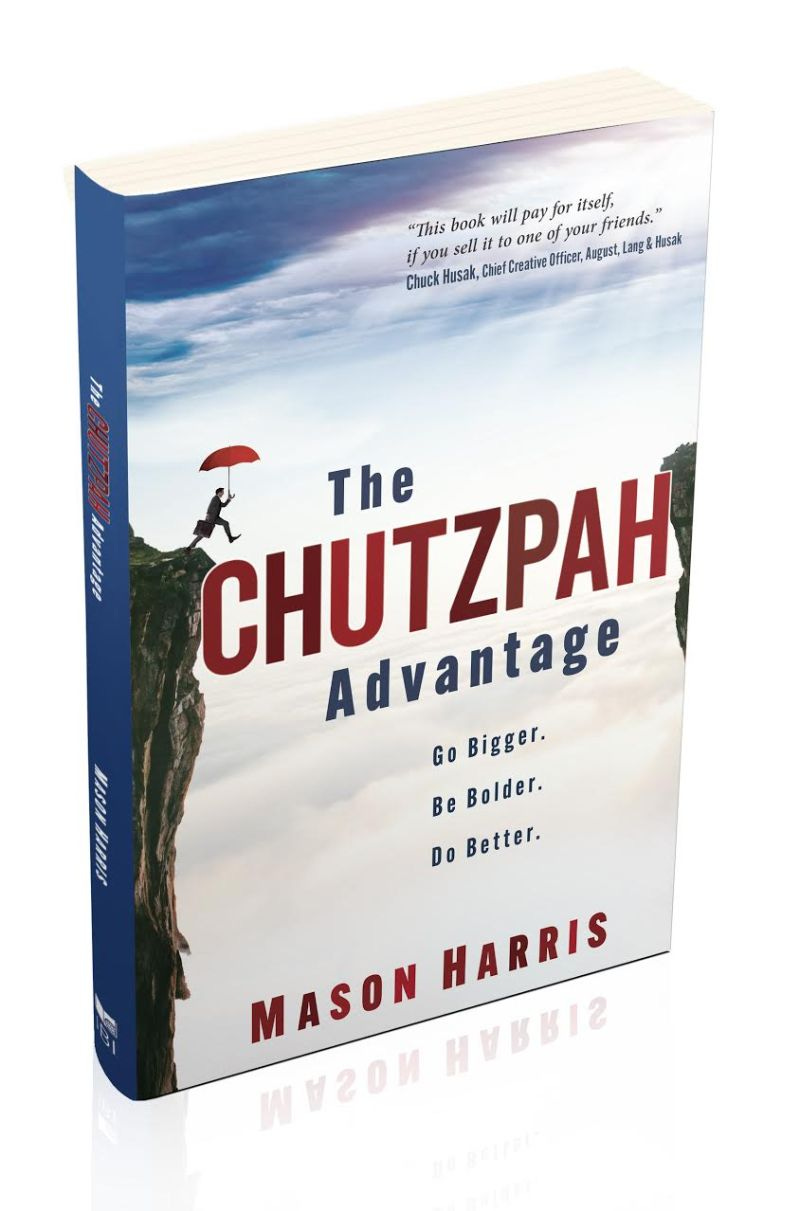Are You Living With Chutzpah?
My friend Mason Harris is the living embodiment of chutzpah. In Yiddish vernacular, he embodies audacity, boldness, and self-confidence. Someone like Mason who is said to have chutzpah is not afraid to speak their mind or do things that may surprise or shock others.
At the end of the day, my chutzpah exegesis led me to discover that there is a subtle nuisance to Yiddish words, one that avoids easy translation. As a result, chutzpah in some circles can have less than favorable connotations like impudence, arrogant self-confidence, brazen nerve.
It can also relate to having little or no concern about what other people think about your actions or behaviors, or even values you adhere to. Displaying chutzpah can also be meant as a statement, like when someone takes a controversial position in support of a particular cause.
According to Mason Harris’ book The Chutzpah Advantage: Go Bigger. Be Bolder. Do Better, chutzpah is akin to a set of behaviors and characteristics that can be directed toward business, team, and personal success. Harris asserts that when used for constructive purposes, it can provide one with a decided advantage, akin to a superpower.
Mason cites examples of this — Cab drivers who deliver passengers to hospitals during COVID; scientists who challenge established doctrine by demonstrating new health treatment protocols; authors and artists who believe so deeply in their cause that they relentlessly pursue it despite all odds.
It’s here where his book offers a roadmap of eight key chutzpah characteristics to apply in your aims towards a bigger, bolder, and better life. When merged with specific behaviors and prevailing personality traits, chutzpah can deliver superior outcomes at home and at work, and for teams and companies. Full of poignant examples, funny anecdotes, and practical applications, it’s a book that’s both entertaining and inspiring.
In an interview with “Great Books, Great Minds,” I asked Mason to share a little bit of his life journey with me along with what led him to write this book. Here’s what he had to say.
“Okay. Journey? Let’s see. I think, in my bio, it’s listed that I’m a first-generation American. My parents are Eastern European immigrants and arrived here in 1949. You may have seen one of the related stories in the book.”
He says that growing up in New York for him was a blast because the area was truly a melting pot.
“Growing up in New York was a blast because it truly was a melting pot. I was exposed to people from all over the world. From different nationalities and different religions. The subways felt like a UN of fellow passengers. It was truly a great experience.”
Mason admits that while NYC is not for everybody, he personally learned a lot. He says that while there are things he doesn’t miss about the city, he does miss the energy and vibe
“I do miss that type of energy — the type of exposure to new ideas that may have been contrary to mine. My ideas have changed since I’ve moved from New York so the experience would likely be a bit different now”
He recounts his days as an undergraduate at Queens College before going on to graduate school at SUNY Buffalo as a pivotal time in his life.
“Career-wise, I worked for big corporations for the most part. My first big opportunity was with GTE corporation which was a phone company back in the day. It was acquired by Verizon back in the day. I went from there and got involved with my first startup. We were fortunate. I had good people. We made a number of fast growth lists. We were doing some things very right and making mistakes along the way.”
It was during this time, says Mason, that he wrote his first book about restaurant marketing while being introduced to the speaking circuit. Recalling that latter experience, Harris shared this:
“As terrifying as it was at times getting up on stage, it was also very rewarding to see that people in the audience were benefiting from my ideas, which were at times quirky. I think some of this quirkiness was related to growing up in New York, where many of us believed we should be stand-up comics.”
Over time, though, he migrated back into the corporate world thinking that his skills would be useful in mentoring and training.
“Mostly I was doing sales management, training people in sales. Yet, I had a particular appreciation for working with younger people, even if they didn’t report to me. As they joined the company on the sales team, I’d reach out to them and welcome them. Even if they were in different offices, I’d say, hey, if you ever have any questions, you know, give me a call. I loved doing this stuff.”
He went from there to another organization, a move that helped him realize that that the only way he was going to truly be responsible for where he wanted to go from that point on was by being on his own again. So he decided to go back to public speaking.
“My target date, my kickoff, which I planned in advance was January 2020. So right before the pandemic hit.”
He recalls sitting at home one day during the pandemic lockdown thinking ‘what Netflix series have I not watched. How much more mush can I create in my brain. So, he began thinking about his first book, which was on the restaurant marketing side.
“I had created this program that I considered foundational -- or really an overview of a higher-level sales training process, which I called the Chutzpah Rules.” That was the first version of what became “The Chutzpah Advantage,” which was designed for salespeople. The feedback I was getting across the country was, you know, this is good. And we like that you didn’t tell us, “Hey. You’ve got to be on the phone, and you got to plan your prospecting and create your schedule.’”
Mason says that they appreciated the fact that the book was at a higher level. Moreover, they said that it was a lot more motivational or inspirational than what they’d heard when other speakers came in and spoke about selling.
The “Chutzpah Advantage” they said captured the real joy of solving customer problems, which is really what I was all about.”
With respect to the book, Harris continues:
“It’s 2020 and I’m sitting here at home realizing that the pandemic is going to be here for a while, even though a lot of people thought, ‘oh well, it’ll be over before you know it.’ From my reading, I was fearful, however, that Covid was a lot more serious than we know, the tip of the iceberg from my perspective. So I decided that now is the time to sit and write the book. That was a chutzpah moment for me. Carpe diem, just do it already.”
Harris explained how he personally experienced the series of behaviors and characteristics described in the book. This prompted him to revise it, making it more of a business and self-help book. Recalling what was running through his mind at the time:
“I realized there were so many lessons that I could pull into the book from things I witnessed on the news, on the internet, or from people I meet every day. So that became the focus, and that’s when I also came up with the idea. I started each chapter with a key story that I could then relate to the behavior or characteristic that was going to cover.”
When I asked Harris about the misconceptions people have about the word Chutzpah, he offered this thought:
“Often when people here chutzpah, they often associate the word to someone like Elon Musk or Bernie Madoff. I say, ‘yea, both of them do fit.’ But chutzpah is also something that the everyday person implements in their lives on a regular basis. They do things that are a bit stubborn, that stretch people’s feelings of comfort, including their own, including stretching both social and physical boundaries.”
Harris then offered these concluding thoughts:
“My hope is that people read the book and look at their lives and say to themselves, ‘you know, there are things in my life that I can improve.’ In the spirit of ‘carpe diem,’ chutzpah ultimately is about seizing the day.”
_____________________________________________________________________________






